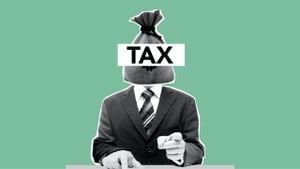Washington's media scene has recently been rocked by some unexpected moves from two prominent billionaires, Jeff Bezos and Patrick Soon-Shiong. Each has decided to prohibit their newspapers, the Washington Post and the Los Angeles Times respectively, from endorsing candidates for the upcoming 2024 presidential election. This decision marks a significant shift, going against long-standing practices where such endorsements were often seen as integral to newspapers' editorial influence and guidance.
The fallout from this decision has been dramatic and swift. Reports indicate the Washington Post alone has lost over 250,000 subscribers, representing about 10% of its readership, following the announcement. This spike in cancellations coincided with various news outlets breaking the story late last week, sparking confusion and frustration among its loyal subscribers. Many found it hard to comprehend the rationale behind the paper's choice to sit out on endorsing during such a pivotal election season.
Initially, Washington Post Publisher Will Lewis attempted to downplay Bezos's involvement, asserting on social media, "Reporting around the role of The Washington Post owner and the decision not to publish a presidential endorsement has been inaccurate." He maintained, "We are an independent newspaper and should support our readers’ ability to make up their own minds." This statement seemed to quell some immediate backlash but soon unraveled as it became clear Bezos himself was the mastermind behind this choice.
Bezos openly defended the decision, stating, "Ending endorsements is a principled decision, and it’s the right one." He expressed concerns about declining public trust in media and suggested doing away with endorsements could help restore some of it. Yet, many commentators and media observers have pointed out the irony of this move. Critics argue it serves as nothing more than self-serving corporate maneuvering, especially as the papers have previously endorsed candidates for various offices yet chose to abandon those standards when it came to the presidency.
The timing of the decision also raises eyebrows. Just days before the presidential election, it appears as though neither publication is officially opposed to Donald Trump or Kamala Harris. Both have openly criticized Trump during his presidency and had reportedly prepared drafts endorsing Harris for this election before the abrupt prohibition was instated.
This situation isn't unique to Bezos. Patrick Soon-Shiong, the owner of the Los Angeles Times, made similar claims about wanting to revert to the paper's historical policy of not endorsing presidential candidates. Critics suggest this attempt to distance from direct political influence is thin cover for avoiding backlash from contentious coverage of Trump. If they are not criticizing any candidate actively, do these publications not end up implicitly supporting whoever stands against Harris? This paradox has not only left readers confused but also has significant ramifications for how news organizations are perceived.
Media is supposed to serve as the fourth estate, holding power accountable and providing clear guidance during elections. With leading publications opting out of endorsements just weeks shy of the polls, one must wonder: what message does this send to readers who rely on these sources for unbiased information?
Many journalists and observers expressed outrage over this stance. The former executive editor of the Washington Post, Marty Baron, echoed sentiments shared widely across media circles, stating, "If this decision had been made three years ago, two years ago, maybe even a year ago, it would’ve been fine. But at this late stage, it was clearly made for other reasons, not for reasons of high principle." Baron’s dismissal of the excuse for the endorsement ban reflects widespread skepticism of the billionaires' justifications. Readers have been left questioning the integrity and independence of these papers when they see major editorial decisions being dictated by owners.
Several political analysts have speculated whether Bezos and Soon-Shiong's decision is part of broader strategies to mitigate perceived editorial biases and curry favor with specific voter groups. Given Bezos's previous controversial interactions with Trump, including multi-million dollar meetings with him through his space company, Blue Origin, it’s not far-fetched to think financiers like him may reassess their editorial policy to avoid galvanizing opposition heading toward another presidential election.
Even more disconcerting is the perception of these media outlets as compromised entities. Since both the Washington Post and the Los Angeles Times have featured aggressive editorial pushes condemning Trump's policies and actions, their retreat from political endorsement just days before the election makes it difficult for the public to trust these outlets would fulfill their obligation to challenge political figures adequately.
Critics have laid out the analogy comparing these recent actions to historical examples of media manipulation by wealthy entities. The presiding concern is the extent to which these power brokers can direct public discourse, potentially undermining democratic principles. The Washington Post and the Los Angeles Times have been cornerstones of the political media ecosystem, and their decisions will galvanize discussions moving forward about ownership structures and editorial independence.
For many, it’s the broader implication of this shift—what does it mean when billionaires take control of newspapers, directing their coverage based on personal whims or business interests? It calls to mind old tales of media tycoons like Hearst or Murdoch, who used their platforms to promote their own agendas. The concern now is directed squarely at Bezos and Soon-Shiong, who, by their very actions, make it look like they are prioritizing their political calculations over the public's need for reliable journalism.
This development has also initiated discussions beyond the immediate ramifications of endorsements. Commentators have started reevaluations of how the Washington Post and other major publications are perceived, especially as they navigate the digital age with growing competition from social media narratives. The rise of misinformation has only exacerbated concerns over media trust. The quandaries of how to engage responsibly with the shifting media consumption habits and how to maintain credibility without swaying to outlandish political influences is at the forefront of cultural dialogue.
Going forward, the decisions made by Bezos and Soon-Shiong have necessarily opened up discourse surrounding conflict of interest within media. Should billionaires be allowed to wield such significant influence over entities responsible for informing the public? Or does ownership equate to unchecked power over the very narratives shaping society? Are these papers, once champions of democracy, now mere tools of their wealthy owners' ambitions?
While the structural dynamics of power and media continue to evolve, the actions taken by Bezos and Soon-Shiong prompt serious questions whose answers will determine much about the future of journalism itself. Will these changes lead to more independence for newsrooms, or will they usher back the age of golden-spirited endorsements solely for political gain? With elections fast approaching and public trust hanging teetering, many eyes will be watching how these decisions shape the next chapter for these iconic papers.



